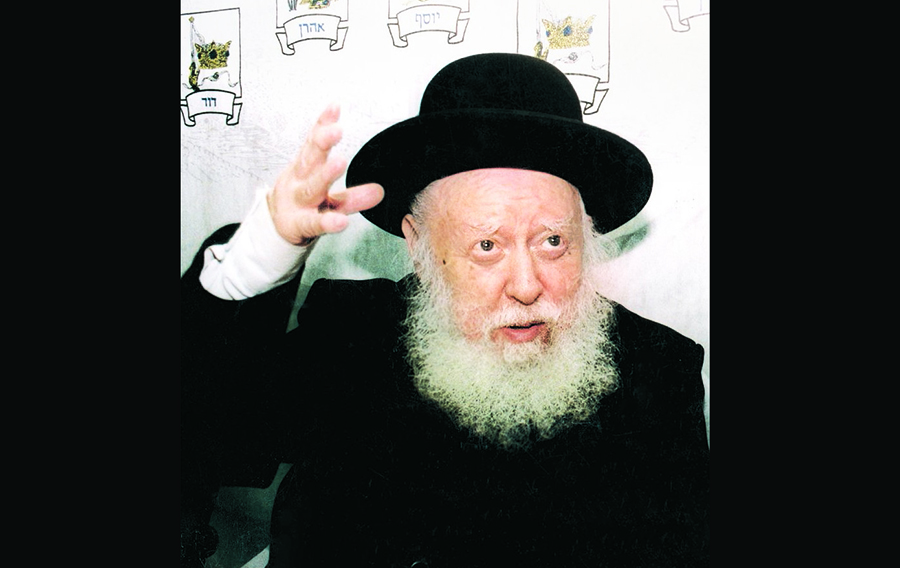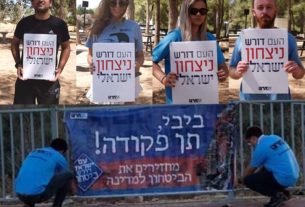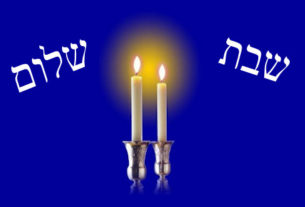Rav Avraham Elkana Kahana Shapira – former chief rabbi of Israel and rosh yeshiva of the Mercaz HaRav Yeshiva in Jerusalem – passed away on the first day of Sukkot 12 years ago at the age of 93.
A seventh-generation Jerusalemite, Rabbi Shapira was born in the Old City and received a charedi yeshiva education at the Etz Chaim and Hebron yeshivot. Recognized as a prodigy in Torah study, the young Rabbi Shapira corresponded with such outstanding scholars as Rabbi Moshe Hevroni, Rabbi Isser Zalman Meltzer, Rabbi Yitzchak Zev Soloveichik, and the Chazon Ish.
‘);
_avp.push({ tagid: article_top_ad_tagid, alias: ‘/’, type: ‘banner’, zid: ThisAdID, pid: 16, onscroll: 0 });
“Rabbi Moshe Feinstein also recognized his greatness,” Rabbi Haim Steiner, a longtime teacher at Mercaz HaRav, said. “In Igrot Moshe (Even HaEzer 24), he deliberates over the words of Rabbi Shapira at length and refers to him as ‘the brilliant and illustrious rabbi amongst the Sages of Jerusalem – fit to rule in every aspect of Torah.’”
When Rabbi Shapira was 42, Israel’s chief rabbi, Rabbi Issac Herzog, appointed him to the High Court of the Jerusalem Chief Rabbinate, and he later served as av beit din in Jerusalem. After forming an intimate friendship with Rav Avraham Yitzchak Kook’s only son, Rav Tzvi Yehuda Kook, and marrying into the family, Rabbi Shapira began teaching at the Mercaz HaRav yeshiva, becoming the rosh yeshiva upon the death of Rav Tzvi Yehuda in 1982.
I first met “Reb Avrum” a year later. I was still living in New York, a budding baal teshuvah, managing the Volunteers for Israel emergency recruitment campaign during the War in Lebanon, sending American Jews to work for a month in IDF warehouses. The founders of the program, Rabbi Yehuda Hazani and Meir Indor, brought me to Israel to see what the volunteers were doing during their time in the country.
I arrived at Ben Gurion a few hours before Simchat Torah. In the morning, after davening Shacharit at Mercaz HaRav and a few mind-blowing rounds of fervent dancing, Rabbi Hazani and Indor brought me into Reb Avrum’s study and introduced me to the smiling rosh yeshiva who was also the newly-elected chief rabbi of Israel.
In answer to Rabbi Hazani’s question if I had to keep two days of Yom Tov since I was planning to make aliyah later that year, Reb Avrum answered that I didn’t have to, but I shouldn’t travel outside of Jerusalem or publicly do anything forbidden on Yom Tov.
After I moved to Israel, a newspaper that was running a campaign against the Chief Rabbinate offered me a job as the editor of an English edition it wanted to start. I asked Reb Avrum if I could accept the position. “You may have reward in This World,” he replied with his almost constant smile. “But you won’t have any reward in the World to Come.”
On another occasion, his combination of Torah scholarship and down-to-earth wisdom startled me completely. I went to him to ask about a screenplay I had written in which a young man from America comes to Israel and is murdered by an Arab terrorist. I told him the plot and said that I was worried that it might fall into the forbidden category of speaking negatively about the Land of Israel, since the murder in the film might give support to people’s fears about making aliyah.
“Movies are for non-Jews, aren’t they?” he asked.
“Not only for non-Jews,” I answered. “Jews watch movies too.”
“Well, if you are worried about discouraging Jews from America, not many of them make aliyah anyway,” he said. “In addition, I am not a maven about movies, but the little I understand is that if you don’t have the murder, you won’t have a movie.”
The answer characterized the dual nature of Reb Avrum – immense Torah wisdom with a down-to-earth simplicity, accompanied by a serious peering expression and a smile in his eyes.
Another time, before Sukkot, I asked him if I could try the mystical kavanot and yichudim when waving the lulav. In his humble manner, he answered, “I don’t know anything about yichudim. I’m not a kabbalist.”
During the protests against the Oslo Agreement, I made a poster portraying Yitzhak Rabin in a negative fashion, escorting Arafat and Assad into the Old City of Jerusalem. The caption read: “Today Gaza, Tomorrow Jerusalem.” One of the volunteers whom I drafted to paste the poster on billboards throughout the city was a student at Mercaz HaRav. Before setting off with a brush and a pail of paste, he wanted to ask Rabbi Shapira’s permission. I accompanied him to the home of the rosh yeshiva. “Would the Chofetz Chaim make a poster like this?” he asked me. “After all, Yitzhak Rabin is also a son of Avraham Avinu.”
Later, when Ariel Sharon decided to give away Gush Katif to Arab terrorists, I interviewed Reb Avrum in a protest film made to rally public opinion against the evacuation. When we asked him if the Torah permitted a Jewish government in Israel to surrender pieces of Eretz Yisrael, he answered sharply, “Yesh yetzer l’rah!” (“There is an inclination to do evil!”) When we repeated the question, wanting the chief rabbi to give a more direct answer, he repeated his words, “Yesh yetzer l’rah!”
But we persisted and asked a third time if a Jewish government in Israel could surrender pieces of Eretz Yisrael, and this time he replied in a loud, irritated voice, “Why do they ask me a question that every child in cheder can answer?!”
* * * * *
A Son Remembers His Father
The Jewish Press: You accompanied your father on some of his visits to America. What can you tell us about them?
Rav Yaakov Shapira: I accompanied HaRav on all his trips to meet with rabbis in America. Once he met with President George Bush, the father, in the Oval Office. It was a time of considerable tension between the State Department and Israel. The White House offered to provide a translator, but Abba insisted that we bring our own, wanting to be sure that his words were conveyed exactly.
The visit was scheduled to last 15 minutes, but it went on for almost an hour. The president asked many questions about Eretz Yisrael. He seemed amazed to learn that it was no longer a barren desert. Surely he knew, but meeting a holy rabbi from the Holy Land seemed to trigger a deep emotional response. You could tell by his contented expression that he really enjoyed spending time with my father.
Can you recall an unusual incident in America that characterizes your father?
Once, in Manhattan, we had some free time before the next scheduled appointment. HaRav insisted we go to what he called “the tallest tower.” He wasn’t supposed to go anywhere without a police escort, but we arranged for someone to drive us to the Empire State Building.
At the very top, he walked all around the observation deck, peering through the binoculars, and gazing this way and that, as if he were checking the kashrut of an etrog. He explained he was trying to see for himself if Manhattan was truly an island surrounding by rivers that could be considered an eruv for Shabbat.
What do you remember about his meeting with the Lubavitcher Rebbe?
When we visited 770 with Rav Mordechai Eliahu, the Rebbe came out of his study to greet the chief rabbis from Israel. When the time came to enter his study for a less public discussion, the three gedolei hador paused before the doorway, each rabbi insisting that the others go first. Finally, it was decided that my father should go first since he was holding a Gemara. Also, the others insisted he had the right of way since he was a kohen.
During their conversation, the Rebbe asked my father if anything was missing for him in America. He answered, “The daily Birkat Kohanim. But I found a Halabi [Syrian] shul where they do it, so in the morning I go to daven there.”
During their long discussion, the Rebbe suggested that they draw up a letter demanding that Mashiach come immediately. Rav Eliahu noted that the three of them comprised a beit din. But my father refused, saying that he lacked the stature to sign a document like that.
When I asked him later about his refusal, he said that Mashiach should be induced by other means, and wherever he spoke to an audience of American Jews, he emphasized the imperative for all Jews to make aliyah, citing the Rambam who equates kibbutz galyot with Mashiach.
To me, your father was the epitome of humility, yet he could also be as fierce as a lion, like when he called upon Israeli soldiers to refuse orders to evacuate the Jews of Gush Katif from their homes. How did he combine these two almost contradictory attributes?
Apparently, the two midot do not necessarily contradict, as we discover in the deeds of our forefathers. Once, at a large Jewish day school in New York, when my father entered the crowded auditorium, a young boy stood up and recited the blessing upon seeing a person of profound Torah wisdom, “Blessed are You, Hashem…who has imparted Your wisdom to those who revere You.”
My father hurried forward to the stage and asked who instructed the boy to say such a thing. “It’s a blessing in vain!” he declared. Everyone was stunned. Then, Rav Mordechai Eliahu stepped forward and said, “If the blessing was said upon seeing me, indeed it is a blessing in vain. But if it was said upon seen Rav Shapira, then it is absolutely proper.”
Do you remember what your father and Rav Moshe Feinstein spoke about when they met?
They spoke about everything. Questions of halacha flew back and forth between them the way ordinary people talk about their children when they meet. My father was particularly concerned with the lack of one central rabbinical authority in America, similar to the Chief Rabbinate in Israel. Rabbi Feinstein agreed.
Did Rabbi Shapira meet with Rabbi Yosef Ber Soloveitchik as well?
Yes. It was arranged that they would both speak at a large beit knesset. When they met, my father stepped forward and kissed the surprised Torah scholar. After all, it is forbidden to kiss a creature of flesh and blood in a synagogue where all of our love is directed exclusively to our Father in Heaven. Sensing everyone’s wonder, my father said, “It is forbidden to kiss a person in a beit knesset, but it is permitted to kiss a Sefer Torah.”
<!–
Publisher #16: JewishPress.com
Zone #113: Comment Banner / (02) / News
Size #15: Banner 468×60 (Comments and Mobile) [468×60]
–> ‘);
_avp.push({ tagid: article_top_ad_tagid, alias: ‘/’, type: ‘banner’, zid: ThisAdID, pid: 16, onscroll: 25 });




